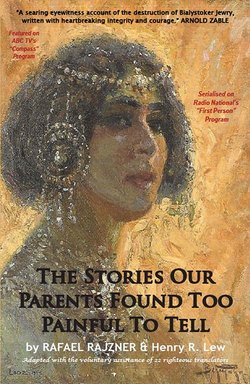Читать книгу The Stories Our Parents Found Too Painful To Tell - Henry R Lew - Страница 13
На сайте Литреса книга снята с продажи.
CHAPTER 1.
ОглавлениеTHE MOOD IN BIALYSTOK IN THE MONTH BEFORE THE WAR.
In August 1939 an ominous mood loomed over Bialystok. All ears were glued to the radio. Negotiations were taking place in Moscow. It was hoped that England, France, Poland and the Soviet Union could come to an agreement, that a crisis might be averted! Would hope prevail - or would despair? Then we heard the news that the German Foreign Minister, Joachim von Ribbentrop, had flown into Moscow and signed a friendship pact with the Soviet Union. All hopes of peace suddenly seemed dead.
Poland mobilised immediately. It was as if everyone’s worst fears were suddenly realised. No one had more to fear from the outbreak of war than the Jews. Hitler’s intention towards them was perfectly clear. Many of the young Jewish men called up for military service were of two minds. On the one hand they saw themselves as victims of rampant Polish anti-Semitism, on the other hand they had to do their best to thwart a German victory.
And then it happened! Germany attacked Poland! Two hundred thousand Jewish soldiers fought valiantly in the Polish army, and thirty-two thousand of them died for it.
THE SUDDEN GERMAN OFFENSIVE.
At 5 a.m. on Friday September 1st 1939 the Polish radio started broadcasting strange messages. “Attention! Attention!” it said, “They are coming! They are flying!” Initially people found these pronouncements confusing, but one thing was certain, they bore an ill wind. It did not take long for the situation to clarify itself. The radio now clearly announced that German planes had started attacking Polish cities. Danzig had fallen to the Germans. Hitler’s main advance was centred on Poland’s west. East Prussia, close to Bialystok, was not yet being used as a springboard for attack.
It took two weeks for the German invaders to reach the outskirts of Warsaw. During this time Bialystok was subject to daily air attacks. The bombings were mainly centred on the railway lines and on military barracks and stores, but some civilians were also killed. Jewish refugees started to trickle into Bialystok from the west, bringing with them the first eyewitness accounts of German atrocities. This trickle rapidly swelled into a flood of broken humanity. Bialystok became overcrowded. Everyone became very nervous. People were fearful of a German occupation and, as yet, not even one German soldier had been sighted.
Friday September 15th 1939 was the second day of Rosh Ha-Shanah (the Jewish New Year). At 10 a.m. we heard that the Germans were at the edge of town. People stopped praying and ran out of the synagogue. They scattered so as to hide from incoming troops.
By midday the first detachments of German soldiers entered Bialystok along Mazowiecka and Danbrowskiego Streets and before long the city’s empty streets were teeming with them. They pulled out machine guns and started shooting at windows. Many people, mostly Jews, were killed or wounded.
A curfew was immediately declared. People were not allowed on the streets between 8 p.m. and 5 a.m.
Nazi soldiers started entering Jewish homes and robbing them. There were instances of Jewish women being shot and killed for refusing to part with their rings. All resistance was immediately met with shooting.
Jews stayed off the streets even during the permitted hours. There were instances where people who ventured out to buy bread and potatoes were killed.
On Monday, the third day of the occupation, rumours started that the Germans would soon hand over Bialystok to the Soviets. Before the day was out these rumours were confirmed by the German command. Radio Moscow had announced the previous day that the Soviet Union was about to liberate its former forfeited Polish territories of Belarus and the Western Ukraine.
This news was welcomed by the Jews. The Soviets were preferable to the Germans.
On Thursday afternoon September 21st 1939 three Soviet aircraft flew over Bialystok. They dropped leaflets, in the White Russian language, to the effect that Soviet troops were on their way to liberate the town.
Then on Friday morning, only hours before the start of Yom Kippur (the Day of Atonement), the Germans packed up and withdrew from the town. They headed back in the direction from whence they had come, towards Warsaw and East Prussia.
A joint welcoming committee of Jews and Gentiles was rapidly convened to greet the incoming Soviets. Some committee members had been in contact with them and expected the first troops would march into Bialystok that afternoon. This information was passed on to the people.
Thousands of people started to crowd Bialystok’s streets in expectation. Working people waved red flags and carried flowers. Some Jewish youth, embittered by their short taste of German occupation, were unable to control themselves. They started throwing stones at the last German soldiers to leave. Fortunately the Germans did not respond to these acts of defiance.
A week of German occupation had caused well over a hundred Jewish deaths and even more businesses and homes had been plundered.
